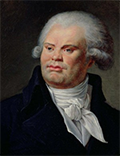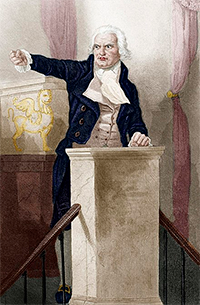Georges Danton
Georges Danton was one of the guiding lights of the French Revolution. A powerful presence, he founded a famous political club and had many followers. He alienated the wrong people, however, and was executed during the Reign of Terror. 
He was born on Oct. 26, 1759, in Arcis-sur-Aube. As a child, he suffered physical maladies, such as smallpox. His father, a lawyer, wanted his son to be join the legal profession, and son followed in father's footsteps, for a time, earning a law degree at the University of Reims and enduring a four-year apprenticeship before winning admittance to the bar. His heart wasn't in it by that time, and he had few clients. He founded the Cordeliers Club, one of many political clubs in France at the time and served as its president for a time. He also regularly made speeches gathering at another well-known similar organization, the Jacobin Club. Danton married Antoinette Charpentier in 1787; they had three children, two of whom survived into adulthood. Danton served in the National Guard in 1789 and, the following year, joined the Paris Commune, the city's administrative body. Among his associates during this time were Camille Desmoulins and Jean-Paul Marat. Danton saw the momentum that was gathering behind the republican cause but abhorred the violence that ensued in support of that cause. After the massacre at the Champ de Mars, in which National Guard soldiers fired on an unarmed crowd, Danton fled the country, living in England for a time. He returned in early 1792, for a time serving as minister of justice, gaining that appointment after the Storming of the Tuileries, after which the royal family were taken prisoner. 
Danton had no love for the monarchy but stopped short of embracing a full-blown republic. His argument was more with the king himself, favoring his abdication in favor of his son. A leader of the National Convention by the end of 1792, he was one of a small majority who voted to execute Louis XVI. Danton saw enemies of the state both outside the country, in the form of the armies of Austria and Prussia, and inside the country, in the form of those who would dare speak out against the government. He was one of the leaders of the movement toward greater security and helped bring about the formation of both the Revolutionary Tribunal and the Committee of Public Safety. One of his more well-known quotes in the wake of this was, "Let us be terrible to prevent the people from being terrible!" The more radical both of those bodies became, the more Danton opposed what they were doing. He was a prominent member of the Committee of Public Safety for a time but resigned when he found himself drowned out by the drumbeat for what became the Reign of Terror. By the summer of 1793, Danton was concerned that the radical movement had gone too far and that the country should be paying more attention to the war effort, especially since recent results had been in favor of France's enemies. With Danton gone, one of his former allies, Maximilien Robespierre, championed the furthering of the Reign of Terror, especially making it easier to send people to the guillotine. A shocked Danton left the political scene once again. He could not stay away a second time, either, and returned to speak out against the Terror. Through the early months of 1794, Danton continued to call for reasoned consideration, even as he battled against charges of corruption in connection with a foreign trading scandal. He watched in guarded shock as one of the Revolution's former leaders, Jacques Hébert, and several of his followers found themselves sentenced to death. In March 1794, Danton and 14 of his followers shared that fate. Danton used all of his formidable oratorical and legal skills to deny all charges against him, but his trial proved to be a formality. He was killed on April 5.
|
|
Social Studies for Kids
copyright 2002–2026
David White




